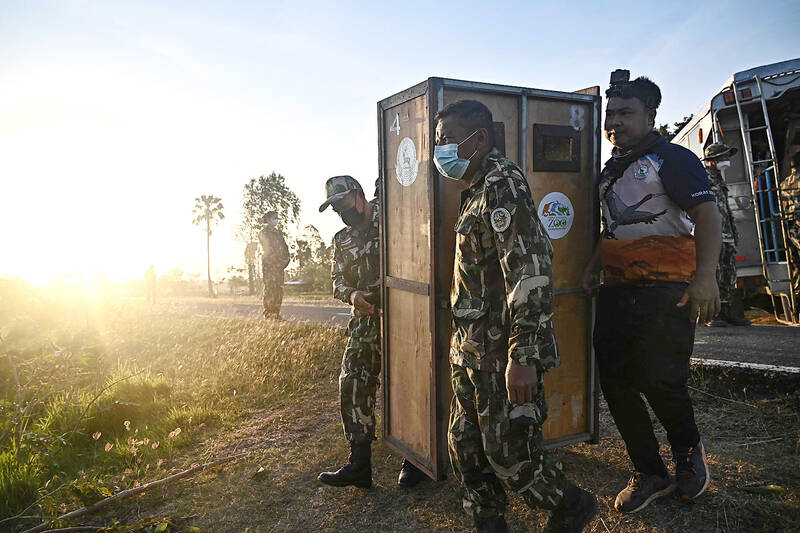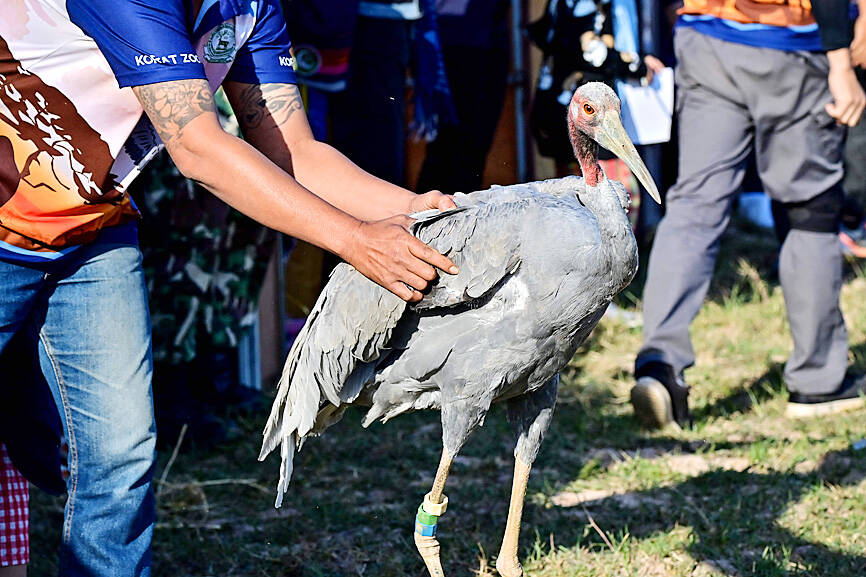As the sun came up, 13 Thai eastern sarus cranes were released over a rippling reservoir in northeast Thailand, the latest effort to revive the almost-extinct species in the kingdom.
More commonly known as Thai cranes, the birds nearly disappeared from the country about 50 years ago — they were last spotted in the wild in 1968 — before the Thai government, Nakhon Ratchasima Zoo and the UN collaborated to save them.
A breeding program, using fowl donated by Cambodia, began in 1989, with the first reintroduction in 2011. The birds can grow to up to 1.8m and weigh almost 7kg.

Photo: AFP
Sarus cranes are classed by the International Union for Conservation of Nature as “vulnerable.” There are an estimated 15,000 remaining in the wild, with the Thai sub-species having been thought to have disappeared from Thailand’s wild wetlands.
However, since 2011, more than 150 birds bred in captivity have been released in Buriram Province.
“It is the only place where the Thai cranes are able to live and reproduce on their own,” Buriram Governor Chaiwat Chuntirapong said.

Photo: AFP
The birds were transported in large, specially adapted boxes — their red-feathered heads watching through mesh windows — from the Wetland and Eastern Sarus Crane Conservation Center where they were bred to the Huai Chorakhe Mak Reservoir.
The latest flock of 13 cranes were released all at once on Christmas Day. The tall birds loudly honked and clumsily flapped as they unsteadily took to the skies accompanied by cheering children and spectators.
It was the final moment in a long journey for the researchers, who carefully nurtured the cranes from hatching, gradually introduced them to the wild and then took them to their final flight to freedom.
“The herdsman wears a suit that hides her body and wears a bird’s head puppet on her hands to teach the birds everything from feeding to familiarizing them with nature,” Nakhon Ratchasima Zoo researcher Tanat Uttaraviset said.
As a result of the long process, about 60 to 70 percent of the birds survive in the wild, he said.
Prior to their release, each bird is microchipped and tagged, enabling researchers to track them and improve conservation efforts.
As well as rearing and releasing the cranes, an important part of the program has been educating people about the species and the environment.
Huai Chorakhe Mak Reservoir was chosen partly due to its natural proliferation of water chestnuts — an important food source for cranes in the dry season.
However, their habitat remains threatened by the “widespread invasion of agriculture,” Nakhon Ratchasima Zoo director Thanachon Kensing said.
The zoo has established a learning cent re, teaching tourists and locals about how to better care for the environment the birds need to survive.
“Changing villagers’ attitudes is difficult, but if we can communicate with them ... this project will be successful,” Thanachon said.
Watching his red-headed charges soar off over the sparkling waters, Tanat had just one hope.
“The ultimate goal is to secure the crane population,” he said.

A new online voting system aimed at boosting turnout among the Philippines’ millions of overseas workers ahead of Monday’s mid-term elections has been marked by confusion and fears of disenfranchisement. Thousands of overseas Filipino workers have already cast their ballots in the race dominated by a bitter feud between President Ferdinand Marcos Jr and his impeached vice president, Sara Duterte. While official turnout figures are not yet publicly available, data from the Philippine Commission on Elections (COMELEC) showed that at least 134,000 of the 1.22 million registered overseas voters have signed up for the new online system, which opened on April 13. However,

EUROPEAN FUTURE? Albanian Prime Minister Edi Rama says only he could secure EU membership, but challenges remain in dealing with corruption and a brain drain Albanian Prime Minister Edi Rama seeks to win an unprecedented fourth term, pledging to finally take the country into the EU and turn it into a hot tourist destination with some help from the Trump family. The artist-turned-politician has been pitching Albania as a trendy coastal destination, which has helped to drive up tourism arrivals to a record 11 million last year. US President Donald Trump’s son-in-law, Jared Kushner, also joined in the rush, pledging to invest US$1.4 billion to turn a largely deserted island into a luxurious getaway. Rama is expected to win another term after yesterday’s vote. The vote would

ALLIES: Calling Putin his ‘old friend,’ Xi said Beijing stood alongside Russia ‘in the face of the international counter-current of unilateralism and hegemonic bullying’ Chinese President Xi Jinping (習近平) yesterday was in Moscow for a state visit ahead of the Kremlin’s grand Victory Day celebrations, as Ukraine accused Russia’s army of launching air strikes just hours into a supposed truce. More than 20 foreign leaders were in Russia to attend a vast military parade today marking 80 years since the defeat of Nazi Germany in World War II, taking place three years into Russia’s offensive in Ukraine. Putin ordered troops into Ukraine in February 2022 and has marshaled the memory of Soviet victory against Nazi Germany to justify his campaign and rally society behind the offensive,

CONFLICTING REPORTS: Beijing said it was ‘not familiar with the matter’ when asked if Chinese jets were used in the conflict, after Pakistan’s foreign minister said they were The Pakistan Army yesterday said it shot down 25 Indian drones, a day after the worst violence between the nuclear-armed rivals in two decades. Pakistani Prime Minister Shehbaz Sharif vowed to retaliate after India launched deadly missile strikes on Wednesday morning, escalating days of gunfire along their border. At least 45 deaths were reported from both sides following Wednesday’s violence, including children. Pakistan’s military said in a statement yesterday that it had “so far shot down 25 Israeli-made Harop drones” at multiple location across the country. “Last night, India showed another act of aggression by sending drones to multiple locations,” Pakistan military spokesman Ahmed